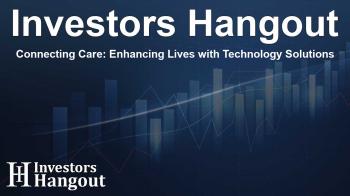Connecting Care: Enhancing Lives with Technology Solutions

Enhancing Safety and Care Through Technology
Parks Associates is at the forefront of research in how assistive technologies and independent living solutions impact households across the nation. As virtual sessions unfold, particularly one that focuses on AI-driven monitoring and connected platforms, discussions emphasize the importance of enhancing safety and care outcomes, reflecting a significant shift toward embracing technology for better living conditions.
The Role of AI and Connected Devices
On June 12, a special virtual session titled "Transforming Safety for People, Workers, and Property at Home and Senior Living Centers" will showcase how new innovations in healthcare technology are changing the way professionals interact with clients in both home and institutional settings. Experts in the field will provide insights into how devices and monitoring solutions are designed to proactively manage risks and improve health outcomes.
Engaging Discussions on Future Care Models
During the session, industry leaders will discuss their insights on the future of care, focusing on how technology must serve to empower caregivers and patients alike. This paradigm shift from reactive to proactive care is vital as we strive for personalized health solutions. Elizabeth Parks, President and CMO of Parks Associates, will moderate this discussion, emphasizing the need for technology to support, not hinder, the independence of individuals relying on these services.
Significant Trends in Assistive Technologies
As of now, more than 14 million U.S. households have adopted various assistive technologies, including personal emergency response systems (PERS) and connected health devices across the country. This growth signifies an increased reliance on technologies that enable a safer living environment. With the U.S. Census Bureau projecting that a significant portion of the population will be over 65 by 2030, the need for innovative solutions in care is more pressing than ever.
Connected Devices and Their Importance
The increasing integration of connected health devices in households mirrors a changing landscape where more individuals are aging in place. According to research, 54% of adults currently own health-connected devices, reflecting a commitment to enhancing safety and wellness through technology. As such devices evolve, they will continue to play a pivotal role in maintaining the quality of life for many aging Americans.
Collaboration and Innovation in the Industry
Collaborative efforts among companies such as Becklar, Alarm.com, and others sponsoring the Connected Health Summit signify a unified approach in addressing how health tech can improve everyday life. Talks at the summit will unveil how interconnected solutions can bridge gaps in care, particularly in senior living and home healthcare environments by providing smart and intuitive systems.
Brock Winzeler from Becklar emphasizes the constant innovation occurring within the technology space. As new devices come to market, they are designed not just for safety but for enhancing the quality of life, ensuring that every individual can enjoy a secure and connected environment.
The evolution of connected devices is no longer about mere enhancement; it's about ensuring a fundamental shift in how individuals interact with their surroundings and the care they receive. This future is about creating systems that predict needs and cater to them before issues arise.
Demonstrating the Impact of Technology
The upcoming Connected Health Summit will serve as a platform to explore these pivotal themes further. Attendees will gain insights into consumer behaviors, new business models resulting from these technologies, and innovative approaches to managing health through IoT solutions. The focus will be on delivering secure, smart environments that promote independence and wellbeing.
Registration and Participation
Those interested in exploring the nuances of connected health are invited to register for the June 12 session at no cost. This opportunity allows for an engaging discussion on how innovative solutions in healthcare can transform consumer engagement and reinforce trust in technology.
Frequently Asked Questions
What are assistive technologies for independent living?
Assistive technologies include devices and systems designed to aid individuals in managing daily tasks independently, enhancing their safety and well-being.
What role do AI-driven solutions play in healthcare?
AI-driven solutions help in monitoring health conditions, predicting needs, and providing timely assistance, ultimately improving healthcare outcomes.
How many U.S. households currently use connected health devices?
More than 14 million U.S. households have adopted connected health devices as part of their everyday living solutions.
What are the key themes of the Connected Health Summit?
The summit will address topics related to new technologies, consumer behaviors, innovative health solutions, and how to meet the demand for independent living services.
Why is proactive care important?
Proactive care ensures that potential health issues are identified and managed before they escalate, leading to better health outcomes and reducing hospital visits.
About The Author
Contact Logan Wright privately here. Or send an email with ATTN: Logan Wright as the subject to contact@investorshangout.com.
About Investors Hangout
Investors Hangout is a leading online stock forum for financial discussion and learning, offering a wide range of free tools and resources. It draws in traders of all levels, who exchange market knowledge, investigate trading tactics, and keep an eye on industry developments in real time. Featuring financial articles, stock message boards, quotes, charts, company profiles, and live news updates. Through cooperative learning and a wealth of informational resources, it helps users from novices creating their first portfolios to experts honing their techniques. Join Investors Hangout today: https://investorshangout.com/
The content of this article is based on factual, publicly available information and does not represent legal, financial, or investment advice. Investors Hangout does not offer financial advice, and the author is not a licensed financial advisor. Consult a qualified advisor before making any financial or investment decisions based on this article. This article should not be considered advice to purchase, sell, or hold any securities or other investments. If any of the material provided here is inaccurate, please contact us for corrections.

